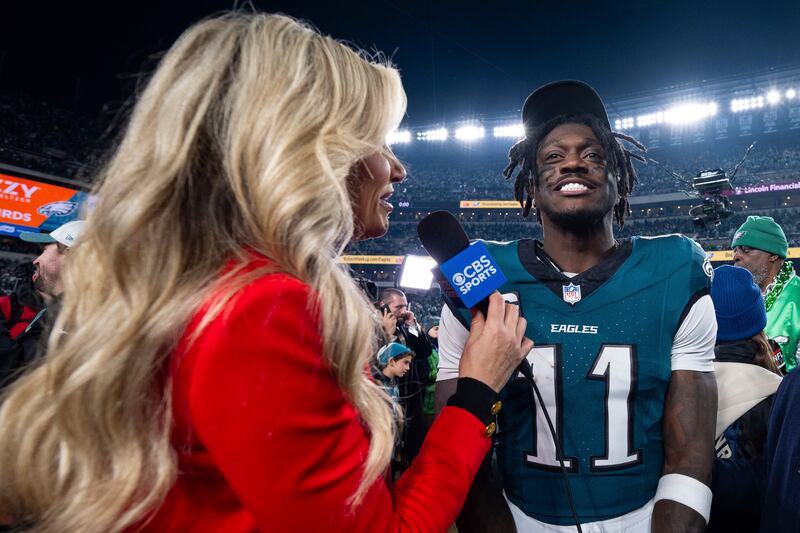Standing on the football field with red confetti floating around him seconds after winning a national championship, Ohio State quarterback Will Howard declared, “First and foremost, I have to give the glory and the praise to my Lord and Savior, Jesus Christ. I wouldn’t be here without him.”
Howard was not alone–many of his teammates also spoke of their faith before answering questions about football. Howard’s counterpart on the opposing team, Notre Dame quarterback Riley Leonard, said in a postgame interview that “Us and Ohio State were the two teams that praised Jesus Christ the most, and I think we strengthened each other in our faith.”

This renaissance of faith in football isn’t limited to the college game — the 2025 Super Bowl will be contested by teams brimming with players who publicly declare their religious beliefs. Philadelphia Eagles wide receiver AJ Brown recently became a meme when a camera caught him reading a self-help book on the sidelines during a game, but Brown has often discussed his passion for reading the Bible, stating “I read the Bible a lot because that’s how I solve my problems.” On the other side of the ball, Kansas City Chiefs defensive tackle Chris Jones wears a wristband that says “I play for God.”
Sports and religion have been connected throughout history. People used to play games to celebrate holy days, and martial arts have meditative practices. Some scholars believe cultures think sports are sacred because they require sacrifices and show the beauty of God’s creations.
Football is no exception. In the past, schools used football to teach Christian values, and many modern football games begin and end with player-led prayers. NFL Hall of Famer and current University of Colorado head coach Deion Sanders says religion and football “go together like peanut butter and jelly.” At a time when Americans are going to church less and say that religion is losing influence in public life, football players openly expressing their faith in the national championship game or Super Bowl go against these trends by keeping the historical connection between faith and sports alive.
But some journalists react negatively to this public turn toward the religious in football, including one who declared, “I’m pretty sure your Lord and Savior doesn’t care if you win or lose a football game.” But such cynical responses miss what these players are saying about how their faith helps them navigate life experiences. Scientific research shows that both practicing religion and playing sports lead to developing good character and important life skills, so it is no surprise that a marriage between faith and football expands these effects.

Practicing hope and resilience
One way that sports develops strong character is through the practice of resilience. Even the best athletes experience a great deal of failure. Those who continue playing sports get practice in failing, learning from failure, and trying again. Similarly, religious belief and practice helps people thrive during hard times, increasing resilience by helping people start fresh after their mistakes and teaching hope in a better future and a higher power. Jalen Hurts, Philadelphia Eagles quarterback, called upon his faith to help him overcome a crushing Super Bowl loss. Speaking after his team won the 2025 NFC Championship, Hurts thanked God “for giving [him] focus and resilience.” Players from both Ohio State and Notre Dame described how their faith helped them manage their feelings about devastating losses and look forward to doing better.
Many players describe how their faith has helped them maintain hope and resilience in the face of devastating injuries. Hurts’ Philadelphia teammate, defensive end Brandon Graham, described how difficult it was for him to endure being labeled a failure when multiple injuries kept him from playing his best. However, Graham found strength through exercising faith, saying, “When I say I trust God, I trust God. Me being hurt now is just like when you get that initial sting, because of course, you still have plans, but then, God laughs at them. That’s how it is. He laughs at them and tells you, ‘I got something way better for you, if you believe it.’”
Athletes also face great uncertainty. Even the most talented and best prepared athletes are sometimes unlucky–they might get sick before a championship game, or a ball might take a bad bounce. Ohio State defensive end Jack Sawyer, who cemented the Buckeyes’ semifinal win over Texas with a dramatic scoop-and-score fumble recovery, described how his faith helps him deal with uncertainty in football. He says his faith has “taught me about how everything is not always going to go your way, but if you keep trusting in God and fight and keep getting up every day swinging, eventually you’re going to come out the other end…Anything’s possible with God, and I’m going to keep trusting his plan.”
When applied consistently, athletes are able to use their faith to reframe challenges as an important and welcome part of their growth. As Ohio State head coach Ryan Day put it, “God made it hard for a reason.”
Sporting selflessness
Some research using brain scans shows a connection between spiritual behaviors and increased selflessness. Similarly, research on teenagers suggests that playing sports helps develop generosity. One important characteristic both Ohio State and Notre Dame players talked about developing through their faith is a greater sense of selflessness. Gee Scott, Jr., a tight end for Ohio State, illustrates this when he says, “It’s literally one of the biggest commandments associated with following Christ–the idea of denying yourself.”
One example is Trevyon Henderson, a star running back at Ohio State. Well established as the team’s #1 running back, Henderson encouraged bringing in a highly-regarded transfer because he believed it would help the team. Henderson embraced his new competition, Quinshon Judkins, with open arms, sharing, “It was a test of my faith, but I praise God for helping me lay down my selfishness, and when Quinshon is out there making plays and having success, still loving him and being happy for him, and I praise God for working on my heart and giving me the strength to just welcome him in and continue to love on him and encourage him.”
Notre Dame’s entire team attends mass together, even though many players are not Catholic. They experience greater brotherhood and unity through a shared religious practice that bridges their various faiths.
The examples of selflessness among the Ohio State and Notre Dame players were so powerful that ESPN’s Rece Davis, who has been the host of the network’s popular College Gameday show for nearly ten years, was moved to summarize them this way: “[players’ faith] became powerful to them, not because they thought it was going to be handed to them to win a game, but it changed relationships, it changed selfishness and made it go away.”
Embracing Humility
Drawing their faith closer to their sports lives helps athletes stay humble, even though sports often celebrate winners and forget about losers. Spiritual practices help athletes focus on what really matters, instead of getting caught up in pride or arrogance.
For example, Notre Dame quarterback Leonard wore a wristband during games inscribed with a Bible verse that referred to Matthew 23:13, which reads “For those who exalt themselves will be humbled, and those who humble themselves will be exalted.”
Leonard’s Notre Dame teammate, cornerback Christian Gray, describes coming to his Christian faith in a way that emphasizes God’s greatness, saying, “I felt it in my spirit. I felt whole. I felt warm…and I’m just looking up to God saying, ‘Thank you, God. I surrender, I surrender, I surrender.’”
Such surrendering to God is striking for an athlete who would never surrender on the field.. Embracing humility through faith also allows athletes to maintain a healthy perspective on the role of sports. Chiefs quarterback Patrick Mahomes could easily focus only on his own successes as a three-time Super Bowl MVP, but says his faith helps him take a broader view on life: “It [faith] just kind of relieves the pressure of playing a football game because I know that I’m on that football field to glorify Him before everything. So it’s not about winning or losing, it’s about going out there and being the best that I can in His name.”
Mikaela Dufur is professor of sociology and Associate Dean for Faculty in the College of Family, Home, and Social Sciences at Brigham Young University. Her research examines children’s and adolescents’ social resources, including development through sports. Daniel Frost is the director of public scholarship in the School of Family Life at Brigham Young University. He also serves as editor-in-chief of Public Square Magazine.



